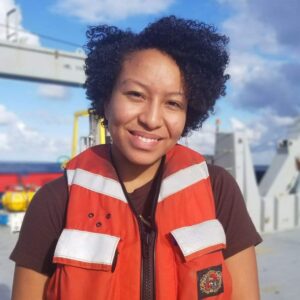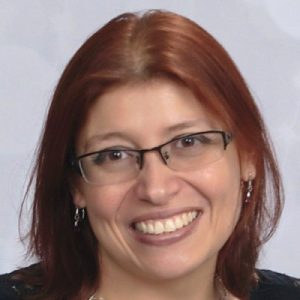Papers by STEM Faculty Padilla-Benavides, Bryant Published

Assistant Professor of Earth and Environmental Sciences Raquel Bryant and Assistant Professor of Molecular Biology and Biochemistry Teresita Padilla-Benavides are two women in STEM whose work has recently been highlighted in national science journals.
Bryant, who will join the Wesleyan faculty in July 2022, co-wrote a paper titled “Microfossil and geochemical records reveal high-productivity paleoenvironments in the Cretaceous Western Interior Seaway during Oceanic Anoxic Event 2” that will be in the December volume of Palaeogeography, Palaeoclimatology, Palaeoecology. Her work has also been featured as a Research Highlight in Nature Reviews Earth and Environment.
Padilla-Benavides recently co-wrote an article titled “The mitochondrially-localized nucleoside diphosphate kinase D (NME4) is a novel metastasis suppressor” alongside Alyssa Carlson ’21. Their work was published in BMC Biology on October 21. Carlson, who graduated in the spring, won the 2021 Wesleyan Butterfield Prize and the 2021 Wesleyan Hawk Prize.

In addition, Padilla-Benavides worked with students Lily Barnes ’22, Joshua Grajales ’24, and Jocelyn Valasquez Baez ’23 on an article about STEM education. The article, titled “Impact of professional and scientific societies’ student chapters on the development of underrepresented undergraduate students,” was accepted for publication on Oct. 15 by Frontiers.
“Undergraduate students from historically underrepresented groups (URG) in institutions of higher education with a focus on science, technology, engineering, and math (STEM) careers often lack the support, resources, and community necessary to succeed in their desired fields,” the abstract reads. “Through mentoring, webinars, seminars, and various research presentation opportunities, national societies and “locally-based” institutional student chapters provide atmospheres in which URG undergraduates can develop the skills required for academic and professional careers in STEM. In addition, national societies and student chapters contribute to outreach activities aimed towards the public in order to foster interest in STEM, as well as to primary and secondary school students to help them develop competency in skills and areas that lead to successful STEM careers.”
Padilla-Benavides and the students also delve into the effects of the COVID-19 pandemic on community building through such societal chapters.
“Though the conditions were challenging, they allowed for new perspectives on problem-solving in the face of adversity,” the abstract reads. “The pandemic promoted the development of creative ways by which institutions and national societies could continue to educate students virtually.”

